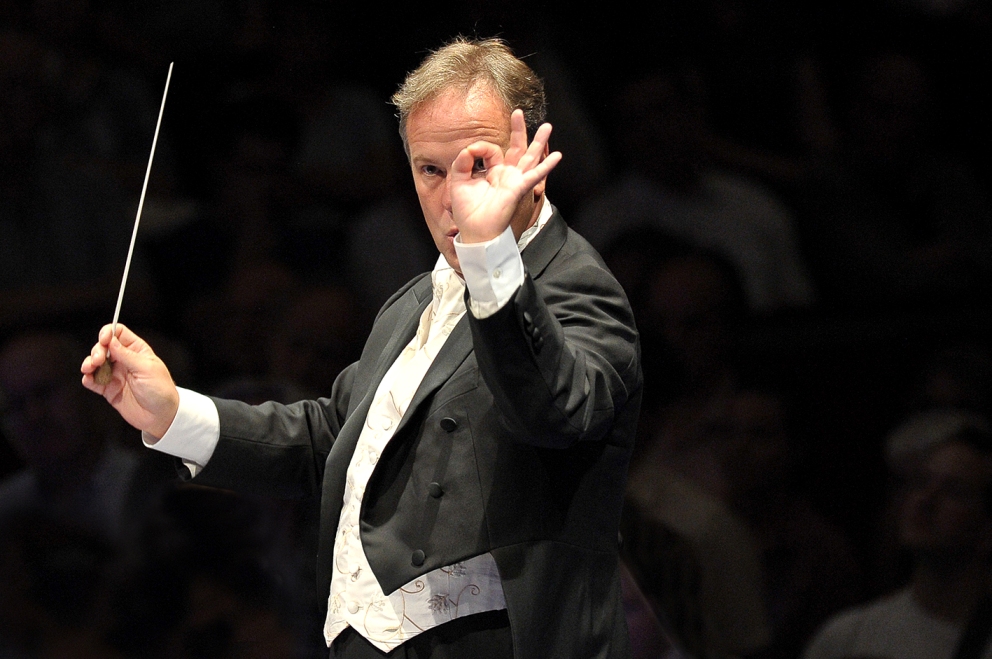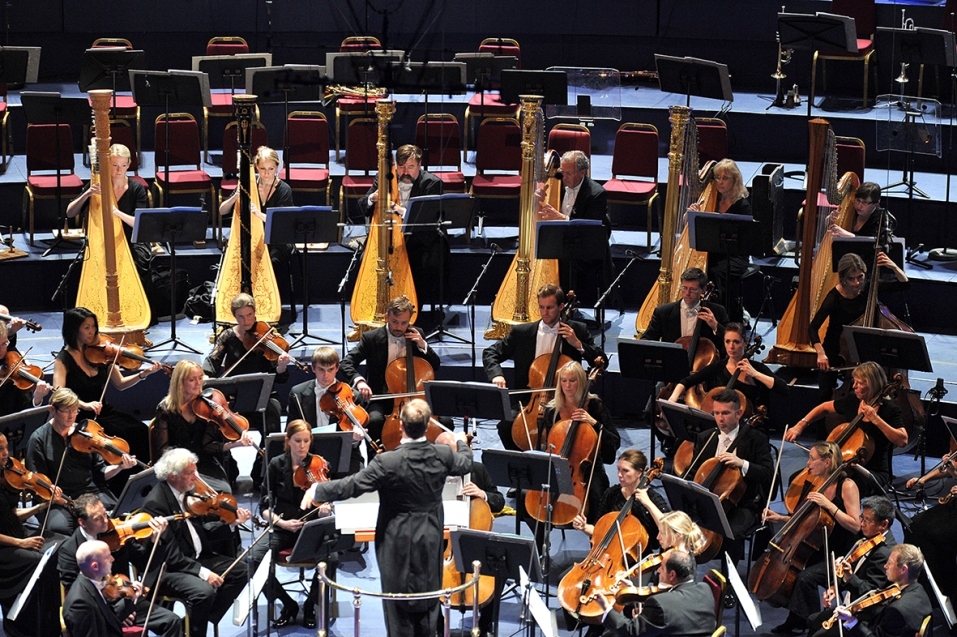Prom 52: Batiashvili, BBC Symphony Orchestra, Oramo | reviews, news & interviews
Prom 52: Batiashvili, BBC Symphony Orchestra, Oramo
Prom 52: Batiashvili, BBC Symphony Orchestra, Oramo
Elgar and Sibelius trump a BBC commission and a hazily pleasant slice of Celtic twilight
Concert programmes are designed to make the mind flexible with constant contrasts. More often, though, the great is the enemy of the good-ish. Last night an Elgar masterpiece was always going to overshadow its second-half predecessor, a hazily pleasant piece for strings and – novelty value – six harps by the colleague Elgar called “dear old Gran”, candidate for this Proms season's resuscitation attempt Granville Bantock.
Always beware – I’ve written it several times before, so this gets boring – a new work that begins with a gesture from out of an over-large percussion department. In the case of Param Vir’s Cave of Luminous Mind (The Transcendent Journey of Milarepa), it was a sudden attack from tubular bells and tam-tam, complementing flute, horns and harp. Much closer to the meditational technique of Tibetan Buddhism, I’d have thought, is the shimmer of four-part muted violins which begins Sibelius’s Violin Concerto, magically hushed in the hands of BBC Symphony strings under their new chief conductor Sakari Oramo. And there’s a composer who needs only one timpanist, not five percussionists wielding over two dozen instruments, to reinforce his magic.
Vir is certainly master of the orchestra: his late teacher Jonathan Harvey, to whom Cave of Luminous Mind is dedicated, did a good job alongside other mentors Peter Maxwell Davies and Oliver Knussen. There’s a virtuoso piano role, fearlessly taken by BBCSO orchestral pianist Elizabeth Burley, and harp writing to match Britten’s, gleaming in the hands of the incomparable Sioned Williams. But even with score in hand on a second (iPlayer) listening, I don’t sense any reflection of Buddhist yogi and saint Jetsun Milarepa’s move towards enlightenment, only stop-start sections of greater and lesser density in both the slow and the faster movements. And I’d question whether the "qualities of light" Vir writes that he has striven for are enough on their own; ‘timbral fragments’ and brief flashes of lyrical lines challenge a large audience’s powers of concentration over a 20-minute span.

There are so many top-notch younger generation violinists around now that it would be foolish to say Batiashvili is absolutely the best, but for me she’s the most individual. Her Georgian encore with strings was charming, but there was an opportunity missed to hear one of Sibelius’s Humoresques: where else would these tuneful miniatures for violin and orchestra get performed?

More a string sinfonietta with an indulgent role for the harps (pictured left) – only swirling their stuff just before the end – "the Celtic" could have been written at the end of the 19th century but actually received its premiere in 1942, eight years after Elgar’s death and with obvious though not ineffective debts to Vaughan Williams’s much earlier string writing. This is late Celtic twilight meandering, very crepuscular in the slow movement based on a Gaelic folksong, but so finely dominated by BBCSO cellist Susan Monks – excelling again in the "B. G. N" rhapsody of the Enigma Variations – that I’d like to hear her as soloist in the Elgar Cello Concerto.
This idiosyncratic, always energising conductor's take on the best-loved orchestral work of Elgar – a composer he has already shown an affinity for while at Birmingham and now over in Stockholm – was, like everything else in the programme, beautifully detailed to project and charm in the impossible space. For me, his control of late-romantic rubato is sometimes just a little pressed; while Ticciati’s LSO Enigma back in November soared, this one moved on with a touch of human impatience. There was less inscaping, and finally an unwillingness to give vulgar vent to the healthy boisterousness of the composer’s crowning self portrait. But the fastidiousness of the wind and string playing augurs very well indeed for Oramo’s regency with the orchestra. The only trouble is that, while this generous programme played to a full house, when they arrive in the Barbican this October the hall may only be half full, or less: an image problem the BBC has still to address.
rating
Share this article
more Classical music
 Bell, Perahia, ASMF Chamber Ensemble, Wigmore Hall review - joy in teamwork
A great pianist re-emerges in Schumann, but Beamish and Mendelssohn take the palm
Bell, Perahia, ASMF Chamber Ensemble, Wigmore Hall review - joy in teamwork
A great pianist re-emerges in Schumann, but Beamish and Mendelssohn take the palm
 First Persons: composers Colin Alexander and Héloïse Werner on fantasy in guided improvisation
On five new works allowing an element of freedom in the performance
First Persons: composers Colin Alexander and Héloïse Werner on fantasy in guided improvisation
On five new works allowing an element of freedom in the performance
 First Person: Leeds Lieder Festival director and pianist Joseph Middleton on a beloved organisation back from the brink
Arts Council funding restored after the blow of 2023, new paths are being forged
First Person: Leeds Lieder Festival director and pianist Joseph Middleton on a beloved organisation back from the brink
Arts Council funding restored after the blow of 2023, new paths are being forged
 Classical CDs: Nymphs, magots and buckgoats
Epic symphonies, popular music from 17th century London and an engrossing tribute to a great Spanish pianist
Classical CDs: Nymphs, magots and buckgoats
Epic symphonies, popular music from 17th century London and an engrossing tribute to a great Spanish pianist
 Sheku Kanneh-Mason, Philharmonia Chorus, RPO, Petrenko, RFH review - poetic cello, blazing chorus
Atmospheric Elgar and Weinberg, but Rachmaninov's 'The Bells' takes the palm
Sheku Kanneh-Mason, Philharmonia Chorus, RPO, Petrenko, RFH review - poetic cello, blazing chorus
Atmospheric Elgar and Weinberg, but Rachmaninov's 'The Bells' takes the palm
 Daphnis et Chloé, Tenebrae, LSO, Pappano, Barbican review - lighting up Ravel’s ‘choreographic symphony’
All details outstanding in the lavish canvas of a giant masterpiece
Daphnis et Chloé, Tenebrae, LSO, Pappano, Barbican review - lighting up Ravel’s ‘choreographic symphony’
All details outstanding in the lavish canvas of a giant masterpiece
 Goldscheider, Spence, Britten Sinfonia, Milton Court review - heroic evening songs and a jolly horn ramble
Direct, cheerful new concerto by Huw Watkins, but the programme didn’t quite cohere
Goldscheider, Spence, Britten Sinfonia, Milton Court review - heroic evening songs and a jolly horn ramble
Direct, cheerful new concerto by Huw Watkins, but the programme didn’t quite cohere
 Marwood, Power, Watkins, Hallé, Adès, Bridgewater Hall, Manchester review - sonic adventure and luxuriance
Premiere of a mesmeric piece from composer Oliver Leith
Marwood, Power, Watkins, Hallé, Adès, Bridgewater Hall, Manchester review - sonic adventure and luxuriance
Premiere of a mesmeric piece from composer Oliver Leith
 Elmore String Quartet, Kings Place review - impressive playing from an emerging group
A new work holds its own alongside acknowledged masterpieces
Elmore String Quartet, Kings Place review - impressive playing from an emerging group
A new work holds its own alongside acknowledged masterpieces
 Gilliver, LSO, Roth, Barbican review - the future is bright
Vivid engagement in fresh works by young British composers, and an orchestra on form
Gilliver, LSO, Roth, Barbican review - the future is bright
Vivid engagement in fresh works by young British composers, and an orchestra on form
 Josefowicz, LPO, Järvi, RFH review - friendly monsters
Mighty but accessible Bruckner from a peerless interpreter
Josefowicz, LPO, Järvi, RFH review - friendly monsters
Mighty but accessible Bruckner from a peerless interpreter
 Cargill, Kantos Chamber Choir, Manchester Camerata, Menezes, Stoller Hall, Manchester review - imagination and star quality
Choral-orchestral collaboration is set for great things
Cargill, Kantos Chamber Choir, Manchester Camerata, Menezes, Stoller Hall, Manchester review - imagination and star quality
Choral-orchestral collaboration is set for great things

Add comment